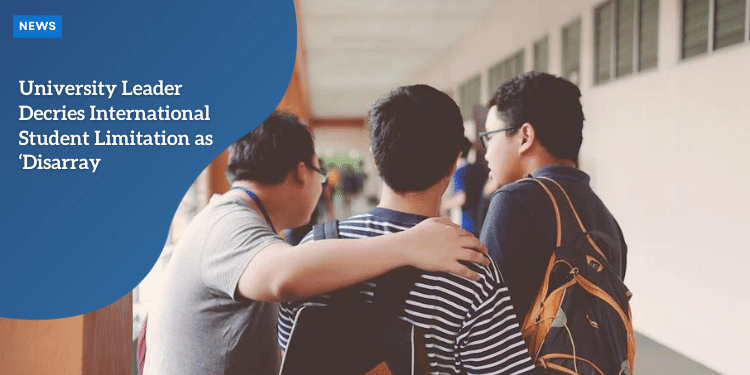University Leader Decries International Student Limitation as ‘Disarray

Anúncios
A university leader has denounced the government’s decision to impose a cap on international student enrollment, suggesting it is influenced more by polling data than by potential economic advantages.
Luke Sheehy, the chief executive of Universities Australia, will express his criticism in an upcoming speech.
He argues that the Albanese government’s strategy to limit international students will not reinforce the nation but will instead lead to significant disruptions within the education system.
Sheehy is expected to present his case at the Independent Tertiary Education Council Australia symposium on the Gold Coast, where he will describe the current policy approach as chaotic and detrimental to long-term educational and economic outcomes.
Anúncios
The government has tabled legislation in parliament seeking to impose a cap on the number of international students allowed to enroll annually at universities.
The restriction would be lifted only with the construction of additional student housing.
The stated aim of this initiative is to preserve housing availability for Australian residents.
Education Minister Jason Clare indicated last month that the country needs to handle the international education sector in a manner that maximizes benefits for Australia.
However, Sheehy argues that the real motivation behind this policy is to sidestep an election controversy regarding whether immigration contributes to the housing crisis.
Anúncios
He will highlight that international education is Australia’s fourth-largest export, adding $48 billion to the economy.
More than half of the country’s fiscal growth in 2023 can be attributed to international students.
As it stands, concerns have already been raised about a potential $500 million economic shortfall in 2024.
Sheehy attributes part of the financial gap to a spike in visa cancellations following last year’s student visa changes.
These changes limited weekly work hours, increased the savings requirement for visa applicants, and restricted students from switching courses within the first six months of their arrival.
He believes the dependency on international students within the university system is a result of a decade of shifting policies that reduced domestic student numbers, an issue exacerbated by the COVID-19 pandemic.
The proposed cap on international students is expected to result in substantial cuts to research funding and could potentially lead to the loss of up to 4,500 jobs in universities.
Sheehy contends that any limitations will also broadly affect Australian society, diminishing export revenue that funds crucial services like Medicare and defense and reducing employment in sectors such as retail, tourism, and accommodation.
Sheehy questions the rationale behind weakening a significant export industry, especially at a time when international education is contributing so substantially to the economy.
He argues that attributing the housing affordability crisis to the number of international students overlooks the benefits they bring to the country.
In his speech, Sheehy is set to call on both sides of the political divide to reconsider the implications of introducing a cap on international students.
He stresses the importance of relying on facts and data rather than ideology or political expedience in shaping policies that impact a thriving economic sector.
His plea is for a policy debate guided by evidence, rather than short-term political considerations.
Impact on Research and Employment
The long-term ramifications for the Australian university system could be dire if the cap is enforced.
Research funding, which heavily relies on the revenue generated from international students, would face significant cuts.
The potential job losses within the universities, estimated to reach 4,500 positions, would not only impact academic staff but also administrative and support roles that are integral to the functioning of educational institutions.
Additionally, the reduction in international students would decrease the diversity and cultural richness that these students bring to Australian campuses, further isolating domestic students from global perspectives.
Economic Contributions and Student Affairs
International students are pivotal not only to higher education but to the broader Australian economy.
They spend on accommodation, food, transportation, and other living expenses, significantly contributing to the retail and service sectors.
Furthermore, these students often engage in part-time work, filling vital roles in various industries and contributing to the local economy.
Sheehy will likely emphasize that cutting down on international student numbers could lead to a domino effect.
With fewer students, there would be less demand for goods and services, which in turn would affect local businesses and the community at large.
Broader Societal Implications
The negative impact of limiting international student numbers extends beyond universities and directly affects Australia’s societal and economic landscape.
Major cities that host large student populations, such as Sydney and Melbourne, could see a notable decline in economic activity.
The student population contributes vibrancy and multiculturalism, enhancing the social fabric of these cities.
In summing up his arguments, Sheehy is prepared to call for a reassessment of the policy, advocating for a balanced approach that supports both the educational sector and the broader economic interests of the country.
He will implore policymakers to acknowledge the substantial contributions of international students and to devise strategies that foster growth rather than impose restrictive measures.






